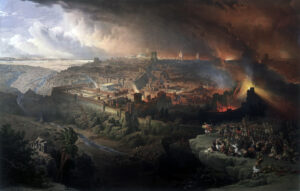 Having recently experienced violent idealists roaming our streets, burning things, breaking things and generally enjoying the fact that they can scare people, I think a brief explanation of how idealism leads to destruction and death is in order.
Having recently experienced violent idealists roaming our streets, burning things, breaking things and generally enjoying the fact that they can scare people, I think a brief explanation of how idealism leads to destruction and death is in order.
The Two Models
There are two primary models of seeing the world that have been duking it out for a long, long time. They were most famously embodied in the rift between Plato and Aristotle, well over 2,000 years ago. Both men had their errors (this was a long time ago, after all), but each came up with a basic model of viewing the world. I’m simplifying, of course, but here they are in essence:
Aristotle: We should look at the things that are (reality), make sense of them and draw useful conclusions from them.
Plato: Everything we see is a weak version of the real and glorious things that are beyond us. We should seek the ideal and bring ourselves toward it. (Fundamentally, this is a belief that abstracts are more real than concretes.)
Our Western civilization, as it formed in late antiquity, was something of a philosophical mix. As the Roman Church gained influence it took a very Platonic course, but the Church eventually had to give up Plato, at least in a large measure, due to the influence of Thomas Aquinas and others.
And so we inherited a civilization more in tune with Aristotle than with Plato. Idealism, however, reverses that, bringing people back to Plato’s way. And while it tends to sound good (“we should hold to the higher principles”), it leads to dark and deadly places.
To explain why this is so, I’m going to use a wonderful but very academic passage written by Harry J. Hogan, from his introduction to The Evolution of Civilizations by Carol Quigley. I’ll pull pieces out of the passage and then elaborate:
“In a Platonistic society, social arrangements are molded to express a rigidly idealized version of reality.”
People who look to and revere a higher power, purpose or principle, tend to become rigid, and to define their principle rigidly. Those who espouse a variant of their belief are immediately seen as an enemy. You can find this in more or less every idealistic group; it’s why, for example, the Bolsheviks killed the other socialists.
If your higher ideal must be the great one, whoever distracts from it is destroying those who listen, and the future of humanity as well. This is how we got self-righteous college students and kindergarten teachers breaking windows and terrorizing people.
“Such institutionalization would not have the flexibility to accommodate to the pressures of changing reality.”
By holding your abstract purpose as high and perfect, you are also claiming perfect knowledge, at least in that area. Actual humans, however, possess no such thing. That isn’t to say we’re stupid or defective, just that we don’t have eternally perfect knowledge. That being so, pretending that we do leads to dangerous places.
A “higher purpose” stands above reality and does not change along with understandings and circumstances.
Bear in mind also that science proper held “we could still be wrong about this” as a fundamental principle. It was a recognition that we don’t have perfect knowledge and that flexibility is necessary.
“Western civilization… is engaged in a constant effort to understand reality.”
This is our model: Looking at reality, attempting to understand it, adapt to it, and if possible use it to our benefit. This model is wide open to differing and even clashing ideas, to infinite experimentation and to endless growth.
Within Aristotle’s model, then, reform is always possible.
Does All Idealism Kill?
All ideals rigidly held can kill, and will in some circumstances.
Principle used as a guide is not a claim to perfect knowledge. Rather, it’s “the best we can currently make out.” And that is a fine thing to steer by; we need only remember that we came to that principle with incomplete knowledge.
And so a humbler principle, like proper scientific findings, remains open to future clarification and modification. That is honest, safe and useful.
The Idealists Are The Barbarians
Idealism tends to spawn clannishness, disgust for “the other,” and soon enough worse.
The “barbarians” who’ve been blamed for destroying Rome were actually trying to get in on the game, but modern idealists really are the destroyers of civilizations, and the processes we’ve noted here are how it happens. None of us possesses perfect knowledge, and by pretending that we do, we spawn destruction and even death.
**
Paul Rosenberg
freemansperspective.com

What if you are a very cynical, bitter idealist?
All the more reason to despise others, I suppose.
Fantastic thoughts here, I truly appreciate them. I think this gets to the root of where so many problems lie. If more of us had the strength and humility to be able to say “I’m doing my best, I could be wrong, and if I learn better I’ll update my principles this would not only be more peaceful but also more capable of rational discourse. Thank you!
My pleasure. 🙂